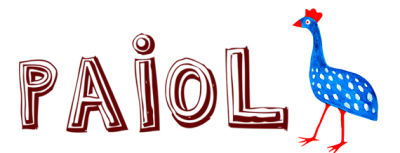
For those who pass by from a certain distance, Paiol may seem just this: a store selling Brazilian handicrafts in the city of São Paulo. But for those who know its interior, it reveals itself differently: a meeting of narratives, a place where the stories of each artisan and each piece sitting on its shelves intersect with that of Lucas Lassen, its idealizer, and the paths he has traveled by during more than a decade of efforts to build a work of valorization, dissemination and sustainability of the Brazilian artisanal production.
First steps
Officially, Paiol was founded on November 5, 2007, but its relationship with Brazil’s cultural production and craftsmanship was born well back in the early 2000s when Lucas studied performing arts at the Institute of Art and Science (Indac), in São Paulo. During those times as a student with little money, Lucas, along with his brother, began to sell traditional handmade carpets made with knitwear leftovers in Minas Gerais at the handicraft fair of Shopping Frei Caneca, in the neighborhood of Bela Vista.
The brand
Enthusiastic about the results and passionate about the contact with a new world connected to the craftsmanship of secular tradition from Minas Gerais, Lucas started venturing more and more along that path. It was from this time the discovery of the Angola chickens carved in wood by Mrs. Janete – a sales success along with the carpets – which, reworked by the artist Renato Diniz, would form in the future the symbol of the store.
THE FIRST STORE
After a seven-year history working at fairs in the city of São Paulo – such as Shopping Frei Caneca’s, the Como Assim fair at the Shopping Center 3, public squares like Benedito Calixto in Pinheiros, supermarkets and hypermarkets – Lucas, now without the participation of his brother, who had decided to give another direction to his business, felt the need to find a fixed address. His first street store opened in the neighborhood of Vila Mariana; from there, the store moved one year later to what is now its most traditional point: Frei Caneca street. And it was there that the name Paiol was born, a perfect metaphor for the reunion of products and cultures that Lucas had discovered along the time.
O AMADURECIMENTO
In 2010, Lucas approached SEBRAE, when he began to participate in artisan business rounds, going to the North and Northeastern states of the country. Soon, he began to expand the diversity of the pieces he brought to São Paulo. During the process, the entrepreneurial awareness of the project was also maturing. What Lucas is proud of is that the project is democratic, since it benefits with responsibility all the parties involved in the productive chain: from the producer, who sells products at a fair price, until the possibility to serve clients of varied profiles, since Paiol has parts of all prices. “They are consequences of the history of Paiol itself.”
Reviewing the steps, Luke evaluates that the most important part of Paiol’s construction process is the creation of real bonds along the way; is a branch of the market that is made by people. where partnerships are links. “If they grow, I grow and vice versa. There is no work relationship, there is human relationship. It’s a nonsense, but it’s real and it makes all the difference. It is a collective thing indeed. This form of relationship vibrates, vibrates in parts – the customer feels. ” Today, he explains not only offers customers products but parts with history and social relevance.
Thus, with a history filled with challenges and thanks to a work of partnership and respect among staff, suppliers and customers, Paiol became a reference in the popular art market. After the opening of a second unit, in street Fradique Coutinho (Pinheiros), the project begins to have a greater position in the virtual world as a next step. “I never imagined that Paiol would arrive where it arrived, I feel fulfilled. Things happened and I did not have a primer: I worked with culture and the relationship with theater became another. “He evaluates and thinks that the project should continue. “I arrived at a very sincere place and the store arrived at a place that is hers, 100% artisanal and 100% Brazilian, that must continue after me.”
ENCOUNTERS
In the following years, Lucas began to travel more and more in order to meet in person the artists most representative of sometimes remote places in the country. He met new craftsmen and their productions, stablished friendships and created relationships of affection and assistance with those artists who would otherwise not have the resources to have their art known in a distant center like São Paulo. Always supporting his work by the idea of fair trade, Paiol is today an example of the concept of social enterprise, opening new markets for those artists in a sustainable way and respecting the way they produce their art.
TODAY
After 10 years, Paiol grew again, opening a branch at Fradique Coutinho street in the heart of Pinheiros. Together, the two stores now play the role of showcase and promotion point for Brazilian popular culture and for a traditional craftsmanship production chain idealized over the years by its creator.

